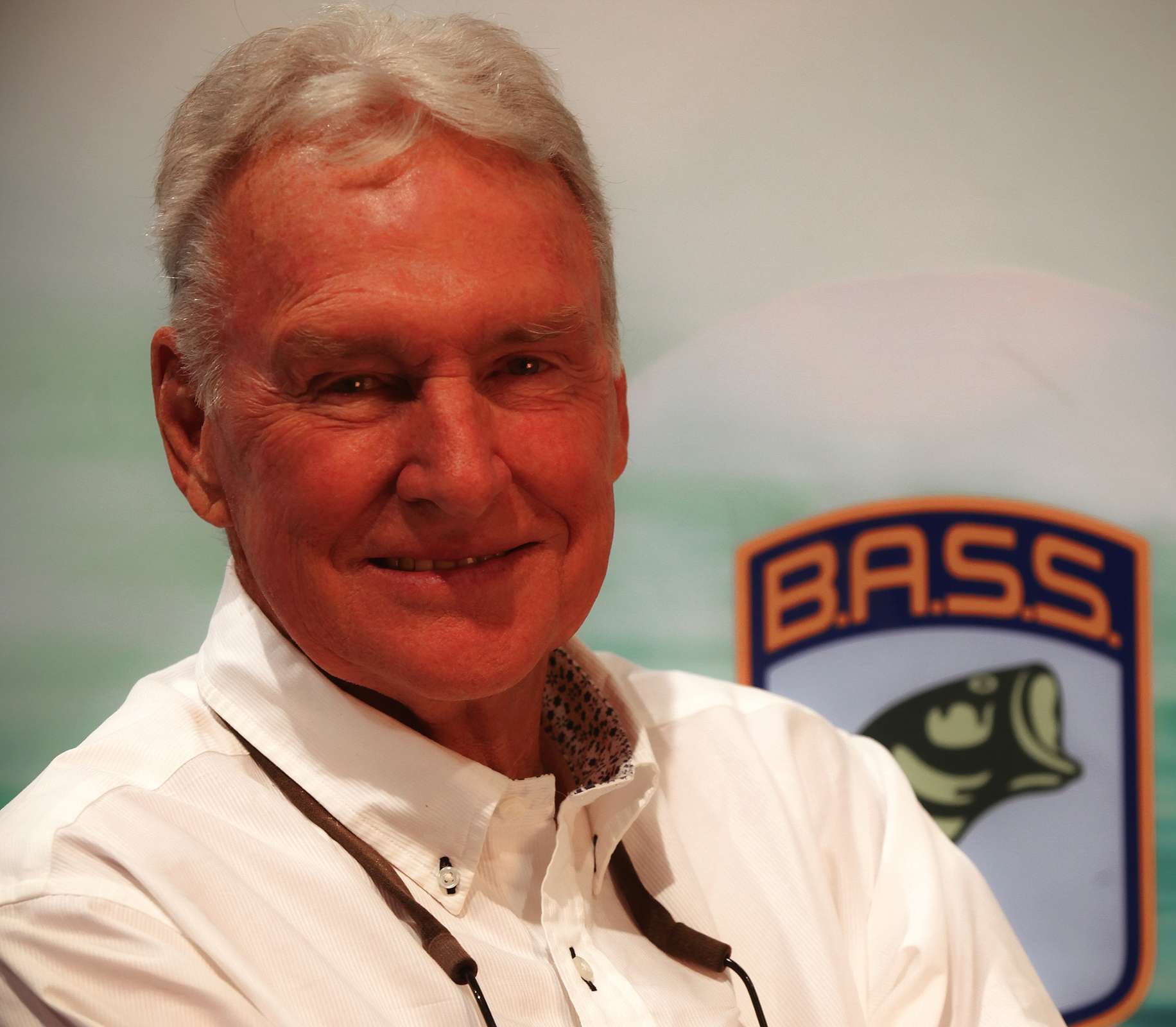
Intro from Jerry
This is chapter 8 from Bass Fishing, Brown Dogs and Curveballs. Its title is “Oh, to be a River Guide.”
I thought you might like a taste of this kind of unusual book. By this time in the story you have been through my early years of life and my professional baseball career has ended. This whole book is more about the people who have kept me on the right course than it is about fishing. Of course, a few fish are captured along the way.
Learn more about the book at www.jerrysbook.com and order your copy from the Bassmaster store.
Chapter 7 had me miraculously running into Forrest Wood, who helps convince me to move to Arkansas and that’s where Chapter 8 picks up.
If you’ve never been to the Ozarks, then shame on you, because you’ve really missed the boat when it comes to seeing a special part of America.
Not only have I now been there, but after a White River float trip, it has put a stranglehold on me. I’ve now loaded up my very young family and we are moving from St. Louis, population a zillion, to Bull Shoals, Arkansas, 350 residents but growing.
Once again I’ve driven across the Missouri/Arkansas border some 20 miles and I’m on highway 178 in Lakeview, Arkansas, about to cross over Bull Shoals dam for the second time in the last few months
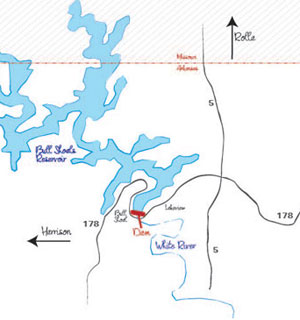 Guess I should be scared to death because of the decision I’ve made, but I’m not.
Guess I should be scared to death because of the decision I’ve made, but I’m not.
Now my wife of only a couple years, Nan, may be having second thoughts, but I have to say she’s a real trooper and seems ready for this challenge.
We have two youngsters at this point, Shannon and Mark. Before we pull out on that dam, let’s talk about something that never crossed my 20-year-old mind when all this is happening.
When you are that age, you just don’t pay attention to life as it’s swirling around you, and the “big picture” is a phrase that you haven’t dealt with much yet. I was focused on becoming a fishing guide on that river, or being involved in the fishing world somehow, and nothing else mattered. Sounds pretty self-centered, but maybe that, too, is normal when you’re that young.
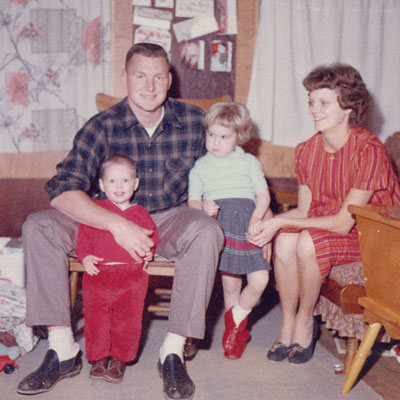 Let me remind you that I had seen, not met, just seen Nan Maples on the ball field when I was about 14. I was way too young when she became Mrs. McKinnis at 18, but I fell madly in love with her on that day when I first saw her and intended to feel that way forever. You see, although I didn’t know at the time, a good relationship was very important to me. I had found one and maybe I took it for granted. Had learned everything about sports up to that point but no one taught me how to be married. I will say this. I was as honest and loyal to that relationship and my family as any man would ever be.
Let me remind you that I had seen, not met, just seen Nan Maples on the ball field when I was about 14. I was way too young when she became Mrs. McKinnis at 18, but I fell madly in love with her on that day when I first saw her and intended to feel that way forever. You see, although I didn’t know at the time, a good relationship was very important to me. I had found one and maybe I took it for granted. Had learned everything about sports up to that point but no one taught me how to be married. I will say this. I was as honest and loyal to that relationship and my family as any man would ever be.
Well, on this day I have made a decision that will affect Nan, Shannon and Mark McKinnis’ lives in a monumental way, all because I want to be a fishing guide. Hope it works.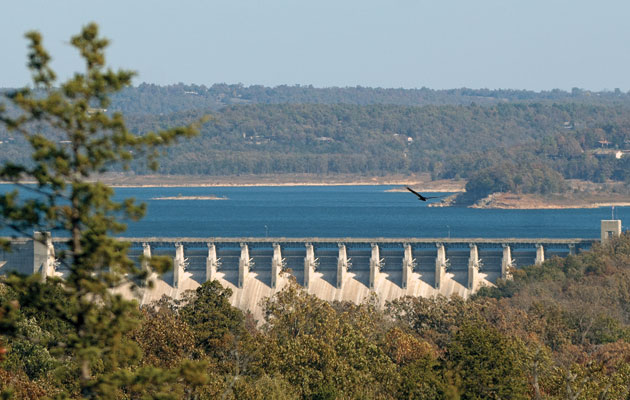
When I arrived in the town of Bull Shoals, which is a half mile from the dam, I was well aware that the river and its trout had lured me to this part of the world. I was not aware that the big lake would change my life once again.
Now, remember the float service I used when I arranged that trip with Forrest? G.O. Tilleys, that’s the name.
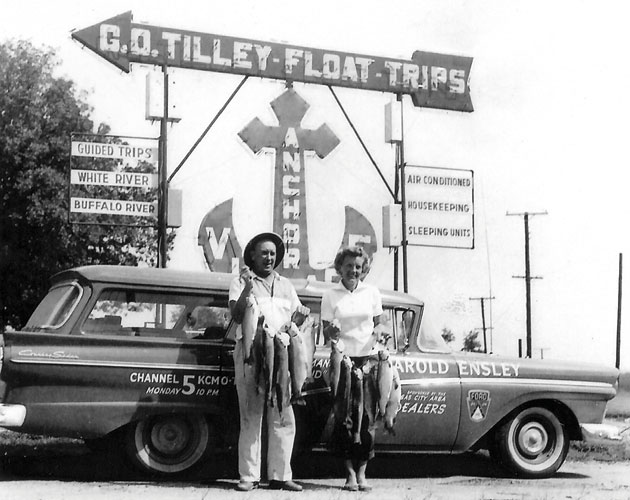 Well, G.O. was kind of like Forrest in that he took a real liking to the McKinnis family, and we ended up living as his resort, The Anchor Inn. We had one bedroom, a kitchenette and that’s what we called home. Although it was crowded, we made out.
Well, G.O. was kind of like Forrest in that he took a real liking to the McKinnis family, and we ended up living as his resort, The Anchor Inn. We had one bedroom, a kitchenette and that’s what we called home. Although it was crowded, we made out.
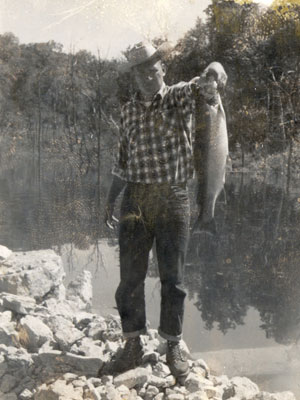 At the beginning of all this, it was still winter and to make ends meet I worked for G.O. at the dock, repaired boats, poured concrete, etc. He was getting ready for spring and summer and I couldn’t keep my mind off that river. You see it was still my goal to become a river guide, and I was finding out that it wouldn’t be easy.
At the beginning of all this, it was still winter and to make ends meet I worked for G.O. at the dock, repaired boats, poured concrete, etc. He was getting ready for spring and summer and I couldn’t keep my mind off that river. You see it was still my goal to become a river guide, and I was finding out that it wouldn’t be easy.
Now here’s what you had to do to become one of these river guides. You needed to become one with that 20-foot john boat and learn where every large rock in the White River lived. Then it was imperative that you knew your way from the dam to Cotter, which was a 15-mile trip.
Bull Shoals Dam generated water on some days, some days it didn’t. So there could be a three or four-foot water level difference from day to day, depending on the generation. This was challenging at times.
You needed to know how to change a shear pin on the lower unit of your 5- or 10-hp motor. The pin would break about every time you would hit a rock, which would limit damage to your lower unit. At the beginning, I got real good at changing those pins.
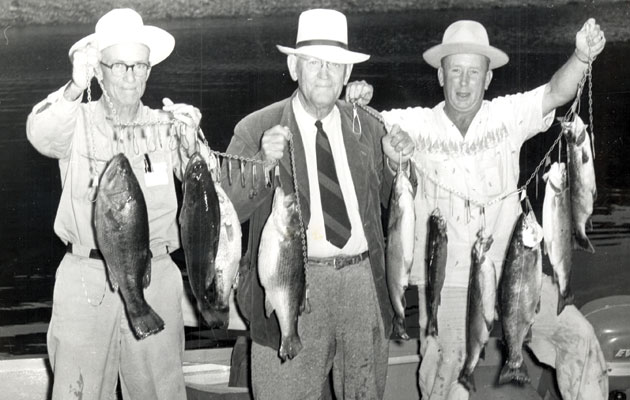 Of course, you have to know where the trout lived and how they could be caught. You had to have what it took to catch these fish yourself, but more importantly you had to teach the two people you were guiding how to catch them. Most times they were pure novices, many having never fished in their lives.
Of course, you have to know where the trout lived and how they could be caught. You had to have what it took to catch these fish yourself, but more importantly you had to teach the two people you were guiding how to catch them. Most times they were pure novices, many having never fished in their lives.
The biggest chore of all was this.
On your first couple of trips out you had to make your party feel like you had been doing this all your life, and getting to Cotter was a snap.
Always wondered what my first party would have thought if they had known I had never been to Cotter before with customers, and last year at this time I was playing baseball in Idaho.
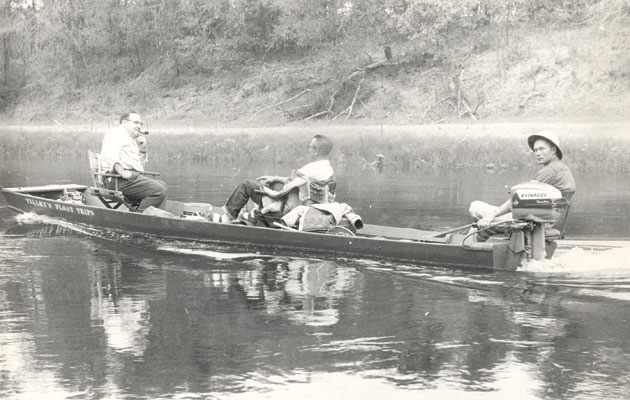 Oh well, I pulled it off. As a matter of fact, I became pretty good on the water. No Forrest Wood, but that was a pretty high level to shoot for. Here’s the thing though, I became a very accomplished guide in a short amount of time, and before that first trip on the river with Forrest I had never been in a boat of any kind. Ever … I’m kind of proud of that.
Oh well, I pulled it off. As a matter of fact, I became pretty good on the water. No Forrest Wood, but that was a pretty high level to shoot for. Here’s the thing though, I became a very accomplished guide in a short amount of time, and before that first trip on the river with Forrest I had never been in a boat of any kind. Ever … I’m kind of proud of that.
Without going into lots of detail, shortly after settling in at the Anchor Inn Resort, G.O. Tilley’s unhealthy lifestyle started getting to him. He smoked too damn much, but that’s a subject for my next book. G.O. comes to me one day and wanted to work out a deal where I would take over the dock and his float service and the business would pay for itself. When you get right down to it, he was just about giving me his business, and he would have had to because I bet I didn’t have $100 to my name.
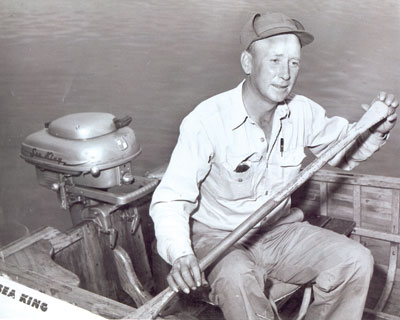 When I look back like I do as I write this, I realize that I don’t give G.O Tilley enough credit for where I am today, and I’ll bet Forrest Wood might say the same thing.
When I look back like I do as I write this, I realize that I don’t give G.O Tilley enough credit for where I am today, and I’ll bet Forrest Wood might say the same thing.
So now after never cranking an outboard in my life, I’m a White River guide and, without a clue as to how to run a business, I’m buying Tilley’s Float Service.
My first 20 years on earth have been quite a journey. Could the next 20 be anything close to that? Well, yes they can, but don’t get ahead of me.
One kind of cool thing. We are now going to move from a cramped resort down to the river and live on the boat dock. You see the dock was a two-story, floating building, and the upstairs was originally meant to be a restaurant, so there’s an extra large room, probably 30 by 30, that will become our living room/playroom. There’s a kitchen and two extra rooms that will become bedrooms. There’s running water in the kitchen but no bathroom. Yes, that’s what I said – no bathroom.
Hold your horses now, there’s an answer to that problem. Just above the dock, on dry land, there’s a big campground, with nice showers and a bathroom facility. So that’s where we showered, that’s where we went to use the restroom, and for several years that’s where Nan went to wash out diapers. Told you she was a trooper.
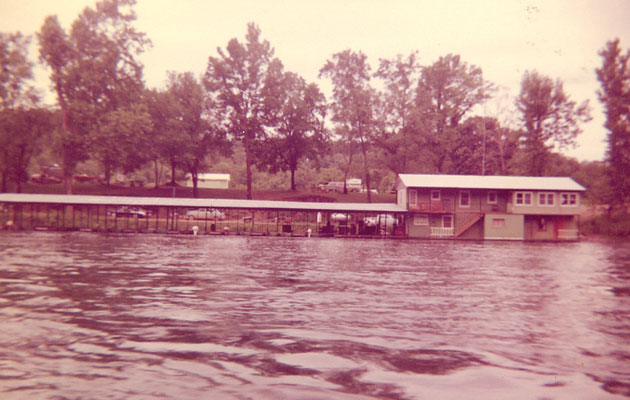
Speaking of troopers, I didn’t like showering in the campground. So most of the time I would wait till it got dark and go to the area where we washed boats, hose myself down, soap and shampoo up, then jump in the river. Sounds pretty good, but here’s the rub. It’s a trout stream and the water is 40 degrees at all times. Talk about taking your breath away.
Because of the water current, the dock eased back and forth ever so slightly, but you got used to it, and you really had to keep a good eye on your two youngsters. So other than all these obstacles, it was actually pretty neat. We lived on the White River – No, I mean we actually lived on the White River.
It’s kind of shame but when I talk to Mark or Shannon about those few years, they just don’t remember much about it. They were too young, I guess.
One more thing before I leave “the living quarters” subject.
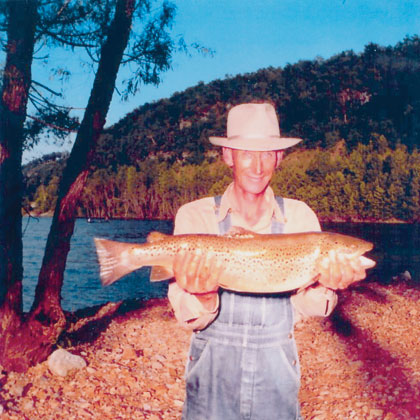 In the mornings and afternoons, from spring to fall, there were always from five to 15 guides on the deck level, getting ready or finishing up trips. They were great guides and equally great people. Most were born on or around the river before the dam was built and, what can I say, they were just Ozark folks with lives that I will never experience again. They became and will always be my family. Don’t know why they took in these people who fell into this dock operator gig, but they did. God bless them.
In the mornings and afternoons, from spring to fall, there were always from five to 15 guides on the deck level, getting ready or finishing up trips. They were great guides and equally great people. Most were born on or around the river before the dam was built and, what can I say, they were just Ozark folks with lives that I will never experience again. They became and will always be my family. Don’t know why they took in these people who fell into this dock operator gig, but they did. God bless them.
Forrest was around from time to time but he didn’t guide out of the dock anymore. He was now operating his own float service, but I know he was always keeping his eye out for me.
The actual dock manager who had started with G.O. and stayed on with me was an old country gentleman by the name of Curlee Hopper. Curlee was arguably the funniest man I ever met, and although we were just together for a short time, he would rank in the top 10 best friends I ever had. Even though that was long, long ago, I miss him today. Remember now, I was just barely shaving and Curlee was a real rock for this youngster.
From time to time, Curlee would bring his son, Randy, over to spend the day on the dock with us. He was 10 years old and was supposed to clean boats, I think. Don’t know if he ever did, but I do know this; Randy Hopper turned into a giant in the outdoor world. You see, he would marry Forrest Wood’s daughter, Brenda, and eventually become president of the Ranger Boat Company. Now I know what you’re thinking, he got to this lofty position because he was Forrest’s son-in-law. No, he got there because his contribution to the product and the company were enormous, and he was and is one smart good ol’ country boy.
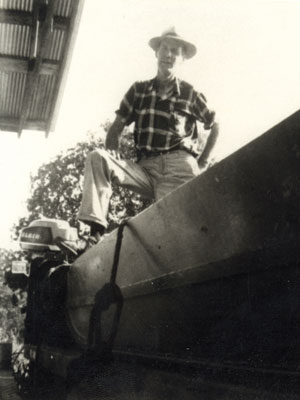 Randy’s still the president of Ranger and has a home just down from where I live on the White River.
Randy’s still the president of Ranger and has a home just down from where I live on the White River.
When I see him, I like to tell him he owes all of his success to me.
He likes to tell me to “go sit on it.”
So I messed around and got a long way from my life on the boat dock, but I have to end that conversation with these comments.
Those were incredible years, and I missed most of it. Yes, that’s what I said. “I missed it,” simply because I was too stressed out over finances to see what was happening. Think about it. I was living on the greatest trout stream on earth and involved with that river, and the people around it, every day.
The kids, Shannon and Mark, my wife Nan and I woke up every morning in the fabulous Arkansas Ozarks and the first site we saw was Bull Shoals Dam.
But after I looked down from the dam, I realized that I had bills to pay, and remember now I’m kind of a perfectionist, so when things aren’t in place, I don’t rest.
The float trip business was pretty good, but every winter I got way behind and summer better go perfect or I’m in trouble.
Mr. Seawright at the grocery store would carry us till spring. I had the payment to G.O. to make on the dock and another $100 loan over here and $300 there to take care of. Then of course from November to March there’s nothing coming in.
I guide occasionally and work at Gordon’s Lumber yard building river boats. You see Wilbur Gordon had a knack for making these wooden rigs, and as far as I know that was about the only place to get one. Well, every float trip operator got in line to get new boats because they only had a two-year life then you replace them.
I got pretty good at making one of these john boats, and I made 20 or 30 bucks a week. Wilbur let me make boats on the side for myself and just charged me for the lumber. That whole arrangement was a life saver.
Oh, how I wish I had enjoyed those times more. How was I to know that someone was looking out for me, and things were headed in the right direction.
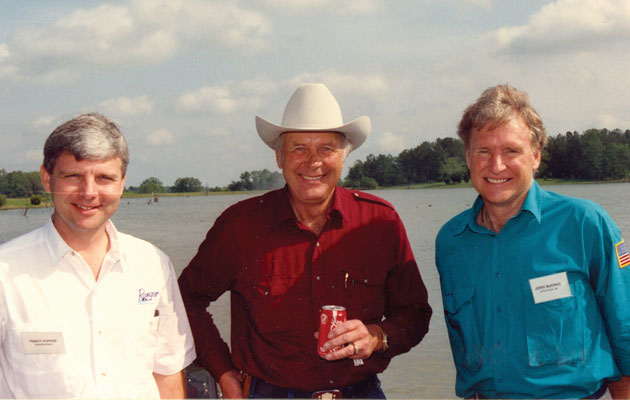 Here’s a good fish tale that will brighten things up. I got to be good friends with a guide by the name of Russell Cox. Worked with Russell from time to time in the winter pouring concrete. He lived in Rea Valley, just below Cotter where a stream, Crooked Creek, flowed into the White.
Here’s a good fish tale that will brighten things up. I got to be good friends with a guide by the name of Russell Cox. Worked with Russell from time to time in the winter pouring concrete. He lived in Rea Valley, just below Cotter where a stream, Crooked Creek, flowed into the White.
So I’m down at Russell’s home and he thinks, before we go to the concrete job, we ought to go down to this creek and see if we can catch some smallmouth bass. Wouldn’t take long.
Well, although I would rather catch trout, this sounded like something to take a crack at. Now we’ve driven down to the White and will walk a short ways to where the creek comes in. We’re carrying a tackle box, two rods, a minnow bucket and a seine.
I had caught smallmouth at my grandpa’s cabin, you will remember, but they weighed a pound at best.
Well, I told you that the White was the best trout fishing in America, right? Well, now I’m telling you that Crooked Creek might have been the best smallmouth stream in America, but before that day I knew nothing about it.
I also didn’t know anything about seining minnows, but I just followed Russell’s lead, and we ended up with a bucket full of creek minnows.
We both had spinning outfits so throwing a plain hook baited with one of the creek minnows, across the creek and into a deep hole in front of a bluff, was easy.
That’s just exactly how my uncles had done it on the Fredericktown river a few years earlier. Remember? That was when we had discovered spinning equipment. The big difference between my uncles’ trip and Russell Cox’s trip was this. The fish that lived in that hole by the bluff weighed three and four pounds. Uncle Arthur’s Fredericktown fish had to hurry to make two pounds.
I don’t know if I had ever had that much fun in one hour. We caught the fire out of those smallmouth. They fought, and jumped and ran like a, well, like a smallmouth. I was beside myself because I didn’t know they got that big.
We finally ran out of minnows and had to go pour concrete. Bummer.
Although I’ve had many great experiences on Crooked Creek, none have ever been better than that first one. Matter of fact, my home is about a mile from the “Creek” as the crow flies today. My son, Mike, brings his son Damon, my grandson, up here when the water’s right, and they float it in a canoe. Kind of makes the old man proud.
I’m back to the boat dock now, with two stories to talk about. Each one with a “big moment” associated with it.
It’s summer 1960. Curlee Hopper and I are probably washing boats, or doing something around the dock. Everett Crow, from Crow/Barnes Resort, calls.
Everett has a gentleman staying with him that would like to trout fish after lunch and needs a boat and guide. Well, all the regular guides were long gone, and I couldn’t find one that could work a half a day.
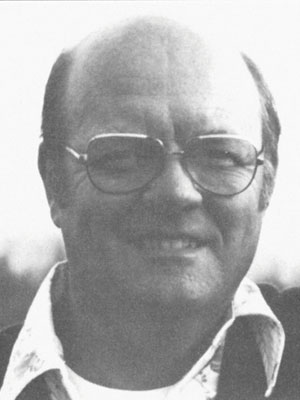 I call Everett back to tell him the bad news, and he hits me with, “Why don’t you guide this gentleman yourself?”
I call Everett back to tell him the bad news, and he hits me with, “Why don’t you guide this gentleman yourself?”
We’ve hit another one of those “what if I hadn’t taken him” points.
The fisherman’s name was Jim Manion, and he was general manager of a television station, WEHT-TV in Evansville, Indiana.
Had a great afternoon. Really bonded. Jim came back several times before I finally left the area.
File that story. Wow, it’s a monster.
My second tale is also a guide trip story, and how that guiding part of my life did so many big things for me. So here comes another of those big bright moments that I’ve called game-changers in past pages. There’s been five so far. The latest being, “why don’t you guide Jim Manion yourself.” Those kind of moments.
Well, listen to this one which will take approximately five seconds when it happens. Five seconds.
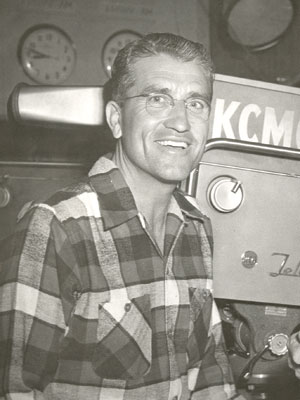 Surely, there’s a number of folks in the Midwest that recognize the name Harold Ensley.
Surely, there’s a number of folks in the Midwest that recognize the name Harold Ensley.
Harold, for many years, had a television show out of Kansas City, Missouri, called “The Sportsman’s Friend.”
I’m so glad that it didn’t have the world “Outdoor” in it. Nowadays it seems as though every other fishing show has to have “Outdoors” involved some way in the title. Actually, that has nothing to do with anything, but this was just “The Sportsmen’s Friend” and it was a good show. Very popular.
Everett Crow, there’s that name again, started Harold coming to this area about 1957 or ’58. He shot shows with G.O. Tilley on the river and covered bass fishing on the big lake as well.
“The Sportsman’s Friend” was a hell of a Bull Shoals area fisherman. Bet he knew more about those two waters than most of the guides.
Well, when G.O. turned the reins over to me, I started guiding Harold and we really hit it off. He was a huge baseball fan, so there you go. We’re buddies.
I’m thinking that we would hit the river 15 or 20 days a year, and he wanted to fish from sunup to sundown, which didn’t bother me.
We get done harassing the trout one spring day and it’s about an hour before dark. Harold wants to hurry to the dock, see if he can get on the phone, find a lake guide and fish till about midnight for bass. Sounded like a good plan, but Harold couldn’t find a guide, so his opportunity to fish for the better part of 20 straight hours was in jeopardy.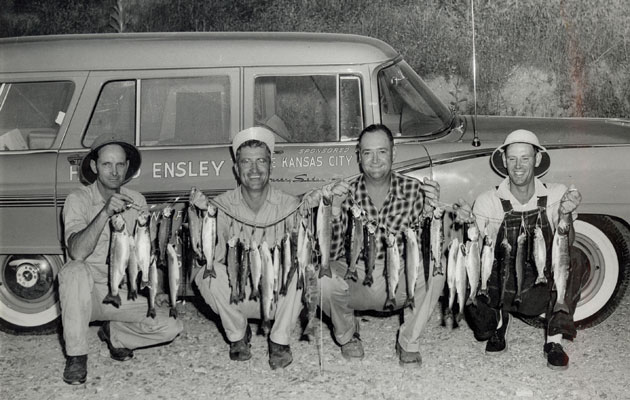
“Wait a minute,” says Mr. Ensley, “this is not a problem. Jerry, you just take me.”
Oh sure, that’s a great choice. Not only have I never been on Bull Shoals Lake before, I’ve never even been in a lake boat. Not once have I turned on the switch to the trolling motor. Man, this is the guy you want taking you out on the big lake, in the pitch dark? Great idea, Harold.
Of course, he starts in on how he knows exactly where he wants to go, and the boat is easier to handle than a river boat, blah, blah, blah.
This is twice now that someone has talked me into guiding when I didn’t want to. Everett Crow talked me into guiding Jim Manion, and now Harold Ensley has talked me into guiding for him. Both situations will be huge over time.
Next thing you know, I’m at Bull Shoals Landing, looking at the back of a Kenzie Kraft, 14-foot-long V bottom boat.
The trolling motor was my worst fear, but when I looked closely, I realize that it wouldn’t be a problem. I wasn’t going to fish, just position the boat for Harold, so I can handle this job.
 As we pull away from the dock, my K.C. buddy sets one of his casting rigs back by me. One that has a half-ounce blacktail jig tied on. The jig has a four-inch Uncle Josh pork eel trailer. Not plastic. Real pork. This is old school baby. This is 40 years before anyone ever heard of “flippin’ and pitchin.” We’re going to cast these jigs. Well, Harold is. I’m just here to take care of the boat.
As we pull away from the dock, my K.C. buddy sets one of his casting rigs back by me. One that has a half-ounce blacktail jig tied on. The jig has a four-inch Uncle Josh pork eel trailer. Not plastic. Real pork. This is old school baby. This is 40 years before anyone ever heard of “flippin’ and pitchin.” We’re going to cast these jigs. Well, Harold is. I’m just here to take care of the boat.
Now I have never seen a largemouth bass bigger than a couple of pounds. Fact is, I’ve never seen many largemouth, period. So this should be a pretty different experience.
Harold points me to Sister Creek. Didn’t know it’s name before, but I did after that night.
“Pull over toward that short bluff, and we’ll fish all the way down to that small private dock.” Harold knew exactly where he was going.
It’s spring so fishing was pretty good, and as I’m jockeying around with the trolling motor, Ensley catches a two-pounder right off the bat.
Wow, that was alright, I thought.
Now I’ve got my feet on the ground as far as the trolling motor goes. That piece of equipment was a Silvertrol trolling motor, by the way.
And also, we had no depth finder, no power poles, no livewell, no GPS … I’m telling you, “Old School.”
The moon was out, so I could kind of see what was going on. I saw good enough to know that Harold just set the hook on a pretty good bass. It jumped one time and was gone.
Folks, do you realize this was about 56 years ago? I’m not making this up as I go. I remember exactly where we started fishing and will never forget that bass jumping off.
Meet me at the Bull Shoals boat dock in the morning and I’ll take you right to that same spot … it gets better though.
“My gosh, how big was that bass?” I said after I finally got my wits about me.
Harold thought it was four or five pounds.
I thought it was 27 pounds. But what do I know.
OK, here we go. Harold tells me to “get in there, the boat’s fine. You need to catch one of these fish.”
People, do you remember a moment in your life that changed your direction? One second along the trail that when over, you can never go back?
Harold Ensley had put me in position to have my first real strike from a bass.
I remember that “tick” like it happened a year ago, not 56 years ago. Like I said, I can take you right to the spot where this happened, but believe it or not, I don’t know if I caught the fish. Don’t even recall setting the hook. I surely did, but I’m not sure.
All I’m sure of is the “tick,” and I have spent the rest of my life attempting to duplicate it. That’s what a bass fisherman does.
Always like to tell people of all ages that it really only takes about four or five seconds to become a bass fisherman for life. That’s how long it takes for a bass to move over to you lure, and swallow it.
There was a big adjustment in my life that night. When I finally went to bed, I still loved fishing for trout, but I was now a bass fisherman with a different level of passion.
This little excursion on Bull Shoals Lake was an eye-opener for me. We’re talking about my first real experience at targeting a bass. I had caught several before but I wasn’t actually fishing for them. I was just fishing. On this occasion with Harold Ensley, I was completely focused on catching a largemouth bass.
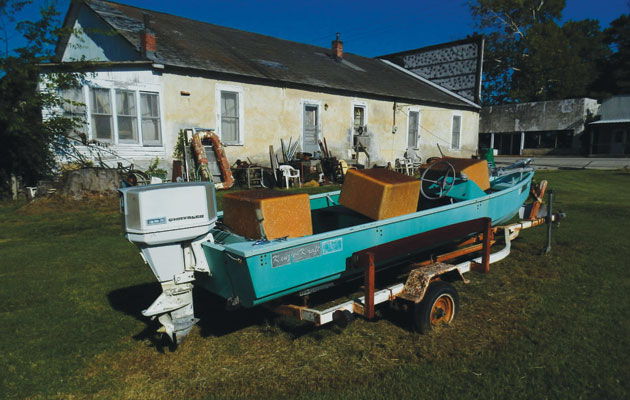 The way we were fishing and the equipment in use is just as interesting as the catching, if you ask me.
The way we were fishing and the equipment in use is just as interesting as the catching, if you ask me.
On that night, we were in a 14-foot V-bottom boat, a Kenzie Kraft. A 10-hp engine moved that boat around.
Today, we would be in a 20-foot bass boat with a 250-hp motor. Wow, what a difference.
On that night, I was using a 12-volt trolling motor that was mounted on the back of the boat. Then we found out that if a boat was a chain, it would be easier pulled than pushed. So today, 99 percent of all bass boats have the trolling motor on the front, and it’s normally a 24-volt device with the batteries in the back.
Then, we had 5- to 5-and-a-half-foot rods, Ambassador 5000 reels, and we cast our lures.
Nowadays, you’d probably be using 7- to 7-and-a-half-foot rods. You’d have a choice between about a dozen much more advanced bait casting reels that would allow you to “pitch” your baits as well as cast them.
Back then, lots of monofilament line was being used. But it was definitely inferior to today’s mono. Of course, there was no fluorocarbon or advanced braid, and I don’t know how we would get by without them in 2014.
Big moves forward in the lure category as you might imagine.
You can’t believe how crankbaits compare from then to now. Well, actually then, when it was time to put a “billed bait” on, you had only a couple of choices, either a Hellbender or a Bomber. They came in three or four colors and only went to one depth. Just look at what we have today.
After that night with Harold Ensley, I really dug into loading up on lures. And can you believe this, there was no plastics to go to. No worms, no grubs, lizards, crawfish, etc. No plastics yet. I say again, look at today.
We didn’t have swimbaits, Senkos, stickbaits, why Rapalas hadn’t even come along yet. Nobody knew anything about Carolina rigs, Texas rigs, drop shotting.
Man, it’s a wonder we ever caught a bass … No, it’s not a wonder. Our lures were good enough, and we fished well and here’s the thing. The bass habits, instincts and feeding patterns are the same today as they were back in the ‘50s and ‘60s. He doesn’t have a clue that our boats are bigger and better, and that we travel 70 miles an hour as opposed to 10. He’s a crafty, clever creature and you better be one step ahead of him if you want to capture him.
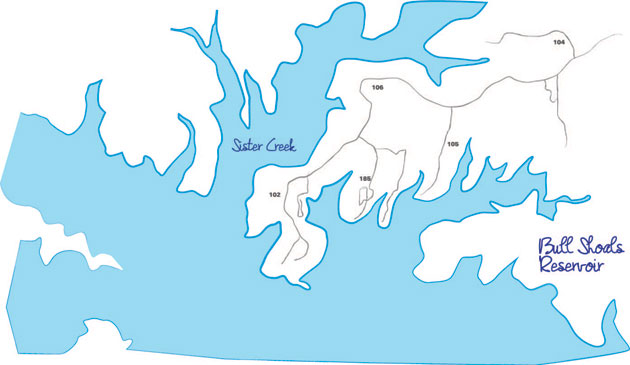 Still on the subject of things a changin’, you should have seen the look on Forrest Wood’s face when I said I’d like carpet in my first Ranger boat. (That boat’s still alive, by the way. It’s in Forrest’s museum.)
Still on the subject of things a changin’, you should have seen the look on Forrest Wood’s face when I said I’d like carpet in my first Ranger boat. (That boat’s still alive, by the way. It’s in Forrest’s museum.)
I came to the Ozarks to learn how to guide on the White River and accomplished that. I thought that knowledge and talent would be worth maybe $10 a day. But somebody had a different idea. Someone thought that guiding would connect me to the people that would direct me to the next steps. “It’s happening just as it’s supposed to.”
When I get to heaven, and after I’ve seen Tom Mann, I’m going to say to St. Peter, “Did I catch that first bass that hit me in Sister Creek?”

